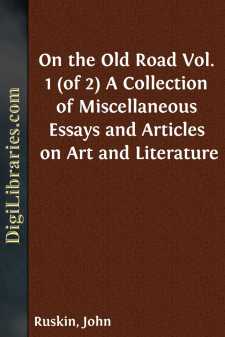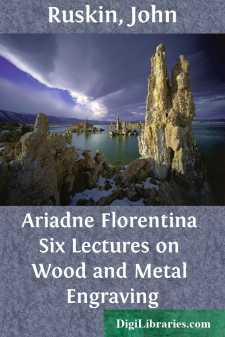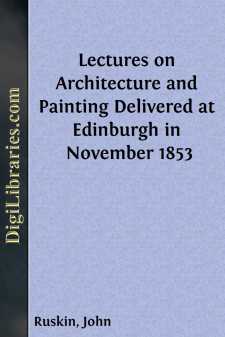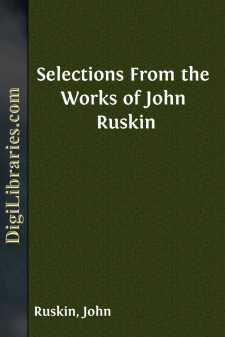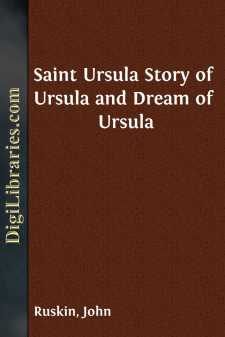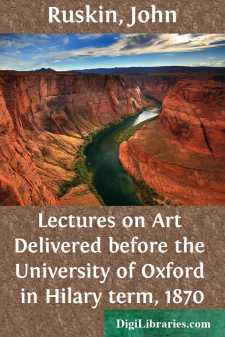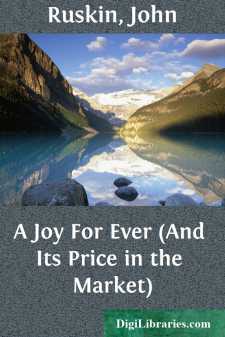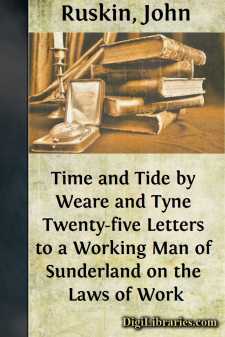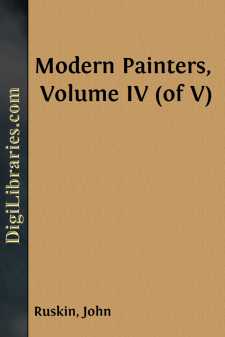Categories
- Antiques & Collectibles 13
- Architecture 36
- Art 48
- Bibles 22
- Biography & Autobiography 813
- Body, Mind & Spirit 142
- Business & Economics 28
- Children's Books 17
- Children's Fiction 14
- Computers 4
- Cooking 94
- Crafts & Hobbies 4
- Drama 346
- Education 46
- Family & Relationships 57
- Fiction 11829
- Games 19
- Gardening 17
- Health & Fitness 34
- History 1377
- House & Home 1
- Humor 147
- Juvenile Fiction 1873
- Juvenile Nonfiction 202
- Language Arts & Disciplines 88
- Law 16
- Literary Collections 686
- Literary Criticism 179
- Mathematics 13
- Medical 41
- Music 40
- Nature 179
- Non-Classifiable 1768
- Performing Arts 7
- Periodicals 1453
- Philosophy 64
- Photography 2
- Poetry 896
- Political Science 203
- Psychology 42
- Reference 154
- Religion 513
- Science 126
- Self-Help 84
- Social Science 81
- Sports & Recreation 34
- Study Aids 3
- Technology & Engineering 59
- Transportation 23
- Travel 463
- True Crime 29
Sort by:
by:
John Ruskin
PREFACE. [Pg v] The ladies to whom these letters were written have been, throughout their brightly tranquil lives, at once sources and loadstones of all good to the village in which they had their home, and to all loving people who cared for the village and its vale and secluded lake, and whatever remained in them or around of the former peace, beauty, and pride of English Shepherd Land. Sources they...
more...
by:
John Ruskin
1st February, 1878. 1. In seven days more I shall be fifty-nine;—which (practically) is all the same as sixty; but, being asked by the wife of my dear old friend, W. H. Harrison, to say a few words of our old relations together, I find myself, in spite of all these years, a boy again,—partly in the mere thought of, and renewed sympathy with, the cheerful heart of my old literary master, and partly...
more...
by:
John Ruskin
DEFINITION OF THE ART OF ENGRAVING. 1. The entrance on my duty for to-day begins the fourth year of my official work in Oxford; and I doubt not that some of my audience are asking themselves, very doubtfully—at all events, I ask myself, very anxiously—what has been done. For practical result, I have not much to show. I announced, a fortnight since, that I would meet, the day before yesterday, any...
more...
by:
John Ruskin
The following Lectures are printed, as far as possible, just as they were delivered. Here and there a sentence which seemed obscure has been mended, and the passages which had not been previously written, have been, of course imperfectly, supplied from memory. But I am well assured that nothing of any substantial importance which was said in the lecture-room, is either omitted, or altered in its...
more...
by:
John Ruskin
Introduction Two conflicting tendencies in Ruskin. It is distinctive of the nineteenth century that in its passion for criticising everything in heaven and earth it by no means spared to criticise itself. Alike in Carlyle's fulminations against its insincerity, in Arnold's nice ridicule of Philistinism, and in Ruskin's repudiation of everything modern, we detect that fine dissatisfaction...
more...
by:
John Ruskin
Fors Clavigera!—to the ignorant a stumbling-stone, to the Philistines a laughing-stock, but to the Initiate a sweet remembrance of many a happy hour passed in informal chat with the Master. The real Ruskin enthusiast has read every word of Fors, and reckons it not least among the precious treasures of the Master's pen. But it remains a fact that to the vast majority of those who have heard of...
more...
by:
John Ruskin
PREFACE TO THE EDITION OF 1887. The following lectures were the most important piece of my literary work done with unabated power, best motive, and happiest concurrence of circumstance. They were written and delivered while my mother yet lived, and had vividest sympathy in all I was attempting;—while also my friends put unbroken trust in me, and the course of study I had followed seemed to fit me for...
more...
by:
John Ruskin
LECTURE I. THE DISCOVERY AND APPLICATION OF ART. A Lecture delivered at Manchester, July 10, 1857. 1. Among the various characteristics of the age in which we live, as compared with other ages of this not yet very experienced world, one of the most notable appears to me to be the just and wholesome contempt in which we hold poverty. I repeat, the just and wholesome contempt; though I see that some of...
more...
by:
John Ruskin
LETTER I. THE TWO KINDS OF CO-OPERATION.—IN ITS HIGHEST SENSE IT IS NOT YET THOUGHT OF. Denmark Hill, February 4, 1867. My Dear Friend, 1. You have now everything I have yet published on political economy; but there are several points in these books of mine which I intended to add notes to, and it seems little likely I shall get that soon done. So I think the best way of making up for the want of...
more...
by:
John Ruskin
PREFACE. I was in hopes that this volume might have gone its way without preface; but as I look over the sheets, I find in them various fallings short of old purposes which require a word of explanation. Of which shortcomings, the chief is the want of reference to the landscape of the Poussins and Salvator; my original intention having been to give various examples of their mountain-drawing, that it...
more...



